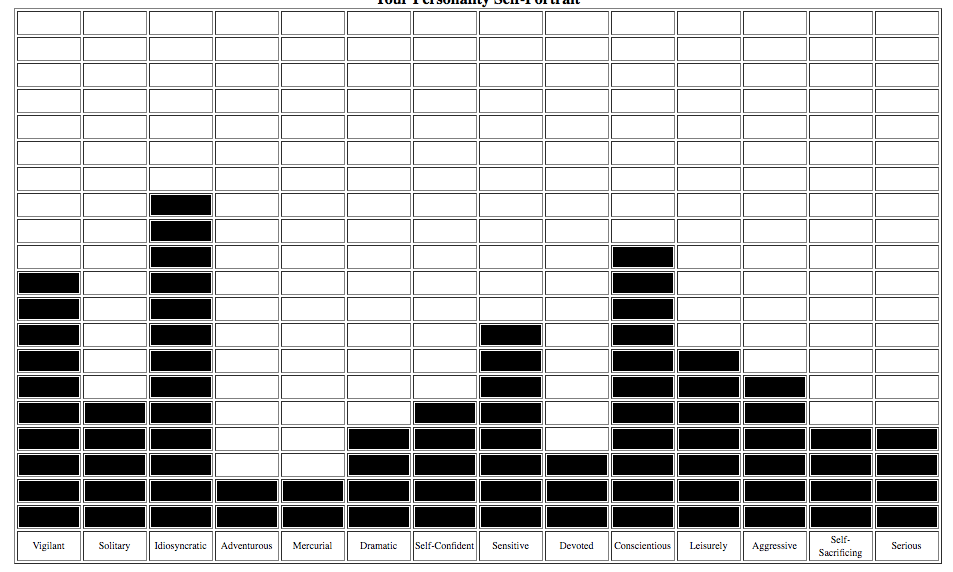Reborn Relic
Damn American Cowboy
- Joined
- Dec 31, 2015
- Messages
- 555
- MBTI Type
- INTP
Dramatic > Leisurely > Adventurous=Self-Confident.
This isn't accurate, but I'll take it. XD

This isn't accurate, but I'll take it. XD

Dramatic types live in an emotional world. They are sensation-oriented, emotionally demonstrative, and physically affectionate. They react emotionally to events and can shift moods quickly. They're 'heart' people rather than 'head' people. They overflow with feeling and zest. They are spontaneous and love excitement, attention, applause, and emotion. They experience life vividly and expansively and have rich imaginations and entertaining stories to tell.
Highly social, they are often happiest when the atmosphere is highly charged and all eyes are on them. They pay close attention to grooming and enjoy clothes, style, and fashion. Dramatic people energize and charm others. Many have profound intuition about other people's feelings. Because they are other-directed, their self-esteem may balance on how other people respond to them.
Dramatic individuals enjoy their sexuality. They are seductive, engaging, and charming. Easily putting their trust in others and characteristically suggestible, they are able to become quickly involved in relationships. They demand a lot of energy from their partners and from subordinates at work. They have a low tolerance for boredom, which can lead to difficulties settling into a relationship or into jobs that do not present continual stimulation.
Life with Dramatic people can be stormy, considering their strong and immediate emotional reactions. Nonetheless, they frequently are attracted to dry, stable Conscientious types who provide necessary balance to their lives (and to whose lives they can bring some excitement). Conscientious partners will need to learn how to compliment and to say, 'I love you,' since Dramatic people lose confidence when they don't receive feedback.
Trouble in a relationship is a major blow to self-esteem, as is being without a partner or lover. To cope with stress and anxiety, Dramatic types like to look on the bright side, to repress the unpleasant and to sustain an optimistic outlook.
These are not detail people, but they are often highly creative, idea types, sometimes brilliant in their hunches. They can be good at persuading others to back their projects and often make strong managers. However, they do best at work and in their personal lives if they can find others who are better at the tedious follow-through.
Adventurous types live by their own values. They are not strongly influenced by others or the norms of society. They love the thrill of risk and routinely engage in high-risk activities. They don't worry very much about others--they expect everyone to be responsible for him- or herself. They are silver-tongued, gifted in the art of winning friends and influencing people. In their childhood and adolescence, Adventurers usually have been high-spirited hell-raisers and mischief-makers. They remain courageous, bold, and tough, and will stand up to anyone who dares take advantage of them.
Adventurous people live in the present and are governed by feelings, not logic. They need thrilling challenges the way most people need food and shelter. Their thrills may come from sports, their careers, their sex lives, the stock market, or the gambling tables. A little of this personality style goes a long way towards building a meaningful, interesting life. A predominance of this style can be a problem, because these individuals may not sufficiently calculate their risks.
A 9-to-5 job can be hard on Adventurous people. However, when their jobs are exciting and highly stimulating, they give a high-quality performance. They appreciate newness and are not loath to undertake a difficult or dangerous project, but dislike routine jobs. They love to keep moving and have an urge to explore. They do not worry about finding work and live well by their talents, skills, and ingenuity.
While they are not motivated toward settling down with one person, they are drawn to people like themselves who like action and excitement and who are highly sexual. They don't tolerate relationships well when the newness fades. They operate best in relationships with partners who are independent and who do not begrudge them their freedom.
Adventurers live in the present. They do not feel guilty about the past or anxious about the future. As they grow older, they may become depressed that they can no longer keep up with younger people or that younger people are no longer attracted to them. Learning to think about the future and considering where they will be in five, ten, or fifteen years can help them prevent this letdown.
Self-Confident types believe in themselves and in their abilities. They have no doubt that they are unique and special and expect others to treat them well at all times. They are unabashedly open about their aspirations and possibilities. They energetically and effectively sell themselves and their goals, so their goals are often achieved. They are able to take advantage of the strengths and abilities of other people to meet their goals and are shrewd in their dealings with others. They have a keen awareness of their own thoughts and feelings.
They often visualize themselves as the hero, star, or most accomplished in their field and accept compliments and admiration gracefully. Self-Confident types have a real talent for leadership and a genuine need to be in charge. They thrive when they are in a position to influence others. They are innately competitive and love status, image, and power. They like to be the attention-getters on the team or in the family. They are extroverted and good at politics. They love getting to the top and enjoy staying there. They identify well with people of high rank and status. They make excellent managers, skilled at delegating, building a motivated team, and rewarding loyalty. But they do not appreciate competition from their subordinates or attempts to share the limelight. They hate being criticized, even if justified. It may not seem to affect them outwardly but inwardly they react powerfully.
They are extremely good at accepting love and admiration but tend to be unaware of the needs of other people. They are so engaged in their own agenda they ignore what is happening to the people around them. They do have a conscience, though; it is political. If they understand they cannot remain on top without being more attentive to those below them, they will make a real effort to be more considerate.
In their personal lives, this lack of attention to others can carry big consequences. They must be reminded occasionally that their spouse or children have individual needs and feelings quite different from their own. Self-Confident people are prone to believe that the people they care about are just like them. Although they may appear selfish and oblivious to others, Self-Confident individuals take rejection very hard. As in their work life, the threat of losing position and importance will often motivate them to work on the relationship before it's too late.
This can be a very strong style, marking individuals who believe they have a purpose on the planet and the strength to discover it. They tend to be successful because they weather the frustrations and doubts that make other people quit along the way.
Leisurely types believe in their right to enjoy themselves on their own terms. They do not allow themselves to be exploited. Unlike Type-A individuals, Leisurely types are not obsessed with time urgency. To them, haste makes waste and unnecessary anxiety. They are easygoing and optimistic that whatever needs to get done will get done, eventually. They accept themselves and their approach to life and believe they are just as good as everyone else and entitled to the best things in life. They maintain that blind luck often accounts for who fares well or poorly.
Leisurely types proceed in their own direction and, when their choices put them in conflict with the people they care for, they often do not know how to proceed. While they do not like to risk important relationships, they need to feel free.
The freedom to be oneself is key to Leisurely types. They play by the rules and fulfill their responsibilities and obligations. But once they've put in their time, nothing will deprive them of their personal pursuit of happiness. What's important to them is not how they choose to enjoy themselves but that they are guaranteed this opportunity. If threatened, these normally nonchalant individuals will vigorously defend their right to do their own thing.
Unless they are in the creative arts or intellectual pursuits, most Leisurely people do not get personal pleasure from their work. They put in their time but are usually not the hard-driving, get-ahead types. They love their leisure time and know how to enjoy it. Unless they have a work-oriented style that balances their Leisurely tendencies (e.g., Conscientious or Self-Confident), they rarely become managers or leaders because they simply aren't interested in getting ahead. At home, Leisurely people tend to do things they enjoy and may put off tasks, such as paying the bills or washing the dishes, which may put a burden on other family members. As well, Leisurely types generally avoid confrontations (unless they feel that their rights have been violated). They prefer indirect resistance.
They have a great ability to enjoy themselves and can lead extremely satisfying lives if they can be free to seek their own pleasures, in their own time, in their own way.
Highly social, they are often happiest when the atmosphere is highly charged and all eyes are on them. They pay close attention to grooming and enjoy clothes, style, and fashion. Dramatic people energize and charm others. Many have profound intuition about other people's feelings. Because they are other-directed, their self-esteem may balance on how other people respond to them.
Dramatic individuals enjoy their sexuality. They are seductive, engaging, and charming. Easily putting their trust in others and characteristically suggestible, they are able to become quickly involved in relationships. They demand a lot of energy from their partners and from subordinates at work. They have a low tolerance for boredom, which can lead to difficulties settling into a relationship or into jobs that do not present continual stimulation.
Life with Dramatic people can be stormy, considering their strong and immediate emotional reactions. Nonetheless, they frequently are attracted to dry, stable Conscientious types who provide necessary balance to their lives (and to whose lives they can bring some excitement). Conscientious partners will need to learn how to compliment and to say, 'I love you,' since Dramatic people lose confidence when they don't receive feedback.
Trouble in a relationship is a major blow to self-esteem, as is being without a partner or lover. To cope with stress and anxiety, Dramatic types like to look on the bright side, to repress the unpleasant and to sustain an optimistic outlook.
These are not detail people, but they are often highly creative, idea types, sometimes brilliant in their hunches. They can be good at persuading others to back their projects and often make strong managers. However, they do best at work and in their personal lives if they can find others who are better at the tedious follow-through.
Adventurous types live by their own values. They are not strongly influenced by others or the norms of society. They love the thrill of risk and routinely engage in high-risk activities. They don't worry very much about others--they expect everyone to be responsible for him- or herself. They are silver-tongued, gifted in the art of winning friends and influencing people. In their childhood and adolescence, Adventurers usually have been high-spirited hell-raisers and mischief-makers. They remain courageous, bold, and tough, and will stand up to anyone who dares take advantage of them.
Adventurous people live in the present and are governed by feelings, not logic. They need thrilling challenges the way most people need food and shelter. Their thrills may come from sports, their careers, their sex lives, the stock market, or the gambling tables. A little of this personality style goes a long way towards building a meaningful, interesting life. A predominance of this style can be a problem, because these individuals may not sufficiently calculate their risks.
A 9-to-5 job can be hard on Adventurous people. However, when their jobs are exciting and highly stimulating, they give a high-quality performance. They appreciate newness and are not loath to undertake a difficult or dangerous project, but dislike routine jobs. They love to keep moving and have an urge to explore. They do not worry about finding work and live well by their talents, skills, and ingenuity.
While they are not motivated toward settling down with one person, they are drawn to people like themselves who like action and excitement and who are highly sexual. They don't tolerate relationships well when the newness fades. They operate best in relationships with partners who are independent and who do not begrudge them their freedom.
Adventurers live in the present. They do not feel guilty about the past or anxious about the future. As they grow older, they may become depressed that they can no longer keep up with younger people or that younger people are no longer attracted to them. Learning to think about the future and considering where they will be in five, ten, or fifteen years can help them prevent this letdown.
Self-Confident types believe in themselves and in their abilities. They have no doubt that they are unique and special and expect others to treat them well at all times. They are unabashedly open about their aspirations and possibilities. They energetically and effectively sell themselves and their goals, so their goals are often achieved. They are able to take advantage of the strengths and abilities of other people to meet their goals and are shrewd in their dealings with others. They have a keen awareness of their own thoughts and feelings.
They often visualize themselves as the hero, star, or most accomplished in their field and accept compliments and admiration gracefully. Self-Confident types have a real talent for leadership and a genuine need to be in charge. They thrive when they are in a position to influence others. They are innately competitive and love status, image, and power. They like to be the attention-getters on the team or in the family. They are extroverted and good at politics. They love getting to the top and enjoy staying there. They identify well with people of high rank and status. They make excellent managers, skilled at delegating, building a motivated team, and rewarding loyalty. But they do not appreciate competition from their subordinates or attempts to share the limelight. They hate being criticized, even if justified. It may not seem to affect them outwardly but inwardly they react powerfully.
They are extremely good at accepting love and admiration but tend to be unaware of the needs of other people. They are so engaged in their own agenda they ignore what is happening to the people around them. They do have a conscience, though; it is political. If they understand they cannot remain on top without being more attentive to those below them, they will make a real effort to be more considerate.
In their personal lives, this lack of attention to others can carry big consequences. They must be reminded occasionally that their spouse or children have individual needs and feelings quite different from their own. Self-Confident people are prone to believe that the people they care about are just like them. Although they may appear selfish and oblivious to others, Self-Confident individuals take rejection very hard. As in their work life, the threat of losing position and importance will often motivate them to work on the relationship before it's too late.
This can be a very strong style, marking individuals who believe they have a purpose on the planet and the strength to discover it. They tend to be successful because they weather the frustrations and doubts that make other people quit along the way.
Leisurely types believe in their right to enjoy themselves on their own terms. They do not allow themselves to be exploited. Unlike Type-A individuals, Leisurely types are not obsessed with time urgency. To them, haste makes waste and unnecessary anxiety. They are easygoing and optimistic that whatever needs to get done will get done, eventually. They accept themselves and their approach to life and believe they are just as good as everyone else and entitled to the best things in life. They maintain that blind luck often accounts for who fares well or poorly.
Leisurely types proceed in their own direction and, when their choices put them in conflict with the people they care for, they often do not know how to proceed. While they do not like to risk important relationships, they need to feel free.
The freedom to be oneself is key to Leisurely types. They play by the rules and fulfill their responsibilities and obligations. But once they've put in their time, nothing will deprive them of their personal pursuit of happiness. What's important to them is not how they choose to enjoy themselves but that they are guaranteed this opportunity. If threatened, these normally nonchalant individuals will vigorously defend their right to do their own thing.
Unless they are in the creative arts or intellectual pursuits, most Leisurely people do not get personal pleasure from their work. They put in their time but are usually not the hard-driving, get-ahead types. They love their leisure time and know how to enjoy it. Unless they have a work-oriented style that balances their Leisurely tendencies (e.g., Conscientious or Self-Confident), they rarely become managers or leaders because they simply aren't interested in getting ahead. At home, Leisurely people tend to do things they enjoy and may put off tasks, such as paying the bills or washing the dishes, which may put a burden on other family members. As well, Leisurely types generally avoid confrontations (unless they feel that their rights have been violated). They prefer indirect resistance.
They have a great ability to enjoy themselves and can lead extremely satisfying lives if they can be free to seek their own pleasures, in their own time, in their own way.




 It's pretty obvious why.
It's pretty obvious why.